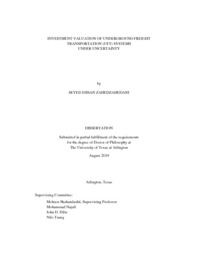
ATTENTION: The works hosted here are being migrated to a new repository that will consolidate resources, improve discoverability, and better show UTA's research impact on the global community. We will update authors as the migration progresses. Please see MavMatrix for more information.
Show simple item record
| dc.contributor.advisor | Shahandashti, Mohsen | |
| dc.creator | Zahedzahedani, Seyed EHSAN | |
| dc.date.accessioned | 2022-01-20T17:33:29Z | |
| dc.date.available | 2022-01-20T17:33:29Z | |
| dc.date.created | 2019-08 | |
| dc.date.issued | 2019-08-05 | |
| dc.date.submitted | August 2019 | |
| dc.identifier.uri | http://hdl.handle.net/10106/30133 | |
| dc.description.abstract | A reliable, safe, and efficient freight transportation system is one of the most essential rudiments supporting the continuous economic growth of a nation. The United States (U.S.), as the world’s largest economy relies heavily on its transportation and freight movement systems. Population growth and economic activity have created a critical need for freight transportation services. E-commerce and online retailing have effectively challenged conventional freight transportation services, increasing the demand for faster delivery. Underground freight transportation (UFT) systems are an innovative technology that can be a viable solution to satisfy the growing demand for freight transportation services. UFT systems are automated freight transportation systems that utilize space beneath congested roads and urban areas to transfer freight between intermodal terminals. UFT systems can potentially reduce truck volume on congested roads and increase freight movement system capacity, thereby improving security and safety as well as mitigating adverse environmental impacts.
Successful implementation of large UFT systems require a detailed investment evaluation to explicitly show planners and decision-makers the economic feasibility of such systems. The main objectives of this study are (1) analysis of financial means and enabling legislations for implementing UFT systems; (2) deterministic investment analysis of implementing UFT systems; and (3) investment valuation of implementing UFT systems under uncertainty using a real options approach.
A comprehensive Life-cycle benefit-cost analysis of the UFT systems for five different scenarios of implementing UFT systems in Texas showed that these systems are economically feasible. Results of sensitivity analysis highlighted the most uncertain parameters affecting the economic feasibility of UFT systems. This analysis showed that the economic feasibility of the large and medium size UFTs is more sensitive to construction cost and revenue from shipments.
For the first time, a real options approach is used to capture the uncertainties and the available managerial flexibilities in investment valuation of UFT systems. The analysis of historical data showed that the freight rate follows a mean-reverting process. While the stochastic behavior of the construction cost is completely different (a GBM process). Yet, the extant real options methods adopted to transportation infrastructures have theoretical limitations to model UFT uncertainties with different attributes. Therefore, a novel bivariate real options model suitable for the investment valuation of UFT systems under uncertainty is developed. The proposed model estimates the market value of the project at each possible state of time and offers an optimal policy to invest in UFT systems.
While the data used and the quantitative results showed in this research may be particular to Texas, the methodology presented in this research can be followed for determining the economic feasibility of UFT systems elsewhere. The findings of this research provide decision-makers with information to objectively appraise UFT projects. | |
| dc.format.mimetype | application/pdf | |
| dc.language.iso | en_US | |
| dc.subject | Real options analysis | |
| dc.subject | Underground freight transportation systems | |
| dc.subject | UFT | |
| dc.subject | Investment valuation under uncertainty | |
| dc.subject | Finance | |
| dc.subject | Funding sources | |
| dc.subject | Benefit cost analysis | |
| dc.subject | Life cycle cost analysis | |
| dc.title | INVESTMENT VALUATION OF UNDERGROUND FREIGHT TRANSPORTATION (UFT) SYSTEMS UNDER UNCERTAINTY | |
| dc.type | Thesis | |
| dc.degree.department | Civil Engineering | |
| dc.degree.name | Doctor of Philosophy in Civil Engineering | |
| dc.date.updated | 2022-01-20T17:33:30Z | |
| thesis.degree.department | Civil Engineering | |
| thesis.degree.grantor | The University of Texas at Arlington | |
| thesis.degree.level | Doctoral | |
| thesis.degree.name | Doctor of Philosophy in Civil Engineering | |
| dc.type.material | text | |
| dc.creator.orcid | 0000-0001-5973-9510 | |
Files in this item
- Name:
- ZAHEDZAHEDANI-DISSERTATION-2019.pdf
- Size:
- 1.400Mb
- Format:
- PDF
This item appears in the following Collection(s)
Show simple item record


